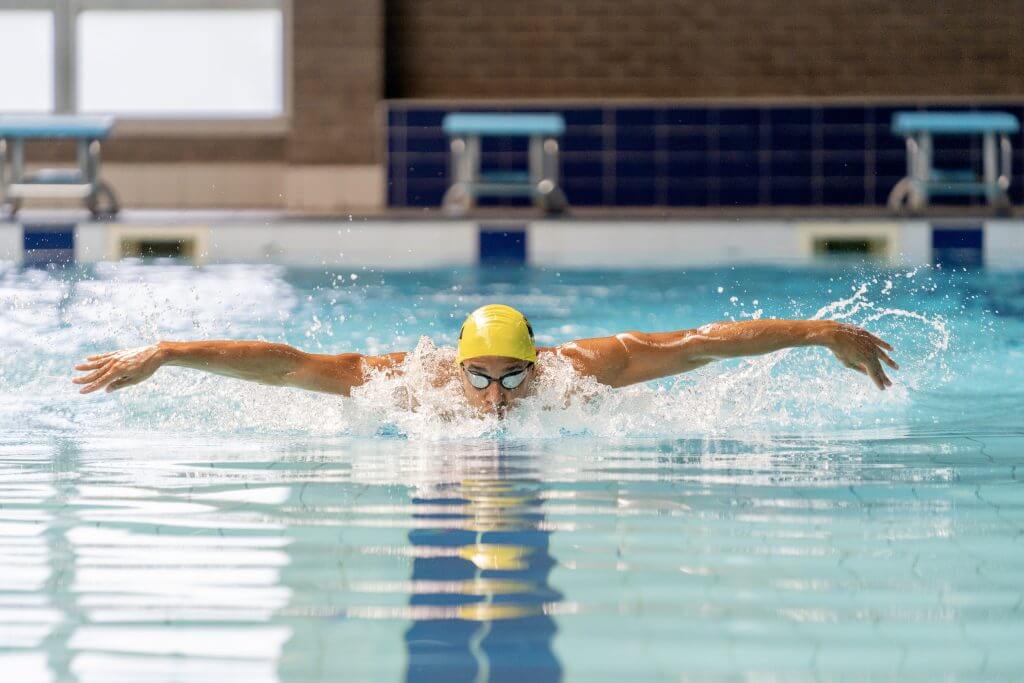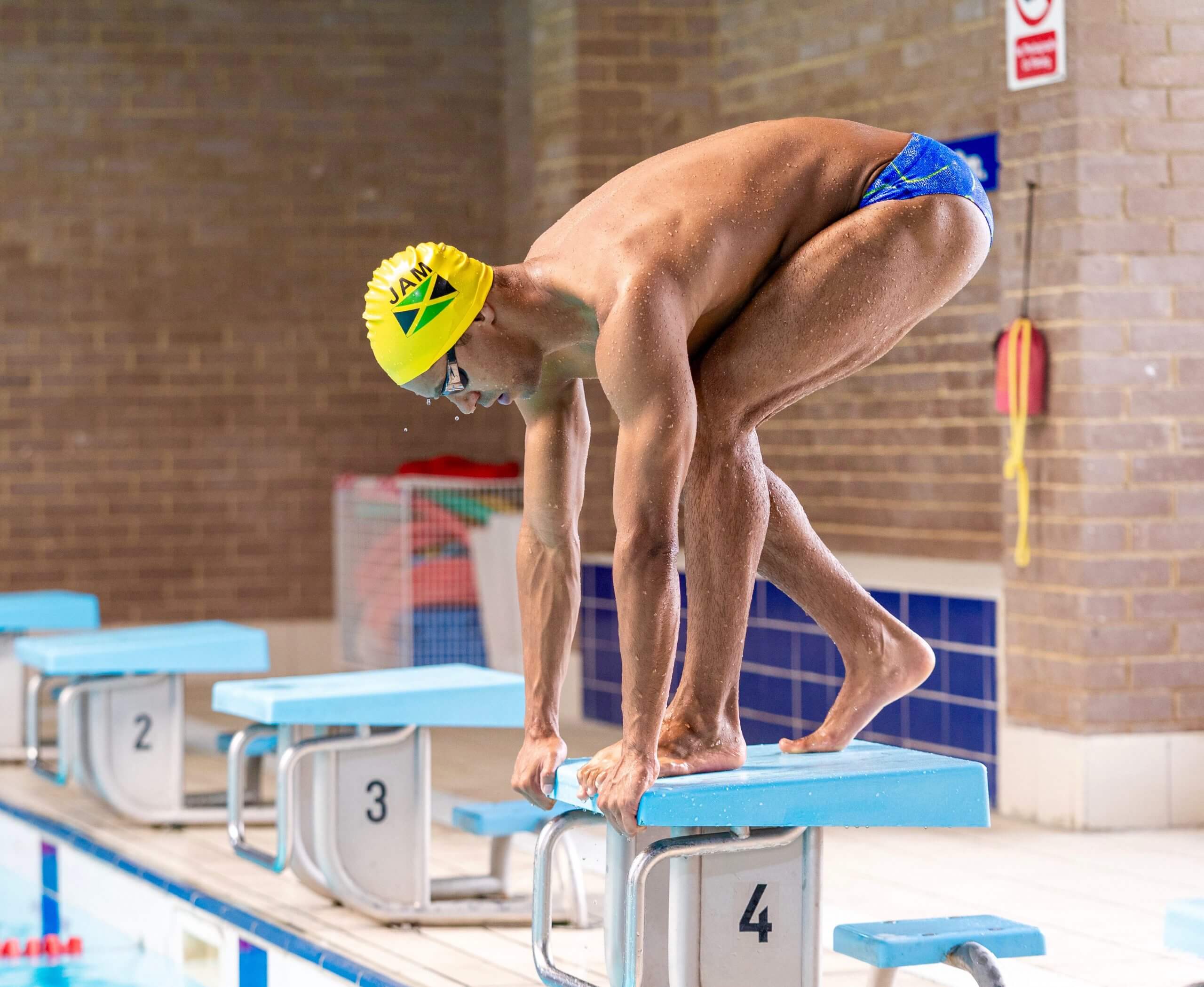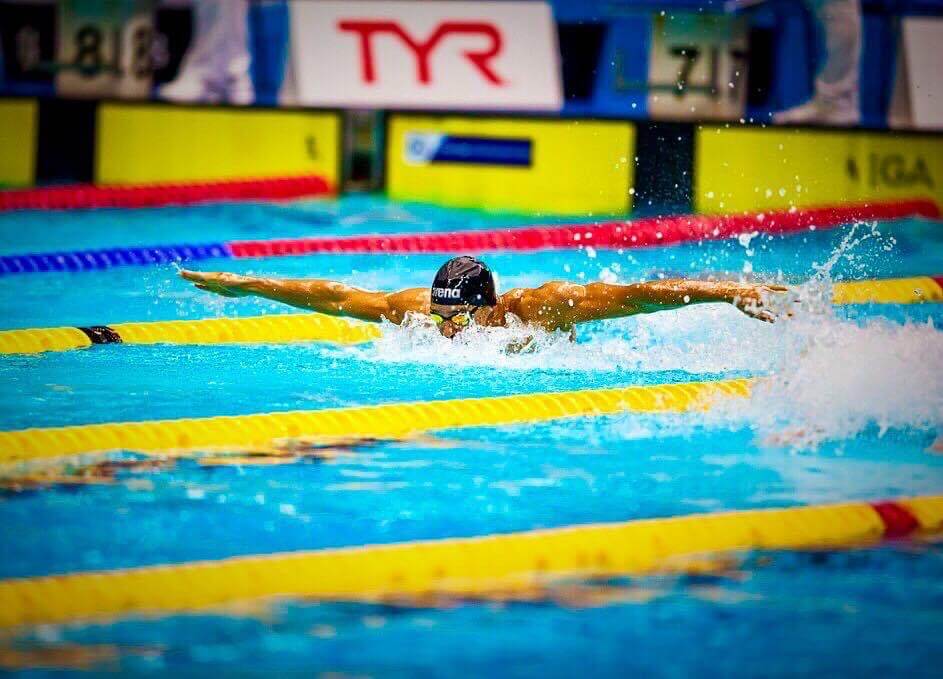Jamaican Michael Gunning Swimming as a Role Model for Black and Gay Communities

When Michael Gunning started swimming as a kid, he never assumed there was anything different about his presence. The native of Kent, England, didn’t see a lot of fellow people of color in the greater London area where he swam. He didn’t see Black faces alongside him on the Great Britain youth national teams.
But to him, that was mere coincidence. He didn’t feel different on pool decks, didn’t perceive different treatment from coaches, didn’t feel an inherent sense of otherness because of the color of his skin, even as it stood in contrast to the default whiteness of British swimming at the time.

Michael Gunning; Photo Courtesy: Joe White
It wasn’t until he got older, when other people’s assumptions and stereotypes were foisted upon him, that he realized the difference in how he saw his swimming identity to how others viewed it.
“It was mainly at school where I would come in smelling of chlorine and people were like, ‘why are you swimming? Black people don’t swim,’” Gunning told Swimming World last week. “I think it was from all those school people and my school friends that kind of made me question whether what I was doing was right and should I pick another sport and was I going to be good enough, was I going to make it? When I was representing Team GB, I never really questioned it.”
Gunning’s journey in the pool has been a pointed dismissal of anyone who doubted or sought to marginalize him. Gunning has proved himself good enough in the pool time and again, competing for Jamaica in the last two World Championships and the Pan American Games, and chasing a berth in next summer’s Tokyo Olympics. As a Black man in an overwhelmingly white sport, as a gay man who came out in 2018, Gunning has surmounted the artificial limitations many would erect to say what he can and can’t do.
The 26-year-old has done that with a unique blend of joy and defiance, the passion for his craft and the desire to prove others’ aspersions wrong. In many ways, it’s two sides to the same coin.
“I want to inspire as many people as I can,” Gunning said. “I’m on this journey, I’m doing what I love and I’m doing pretty well at it, and if I can inspire as many people on the journey as I can, then great. And I knew by me swimming for Jamaica, it would, I suppose, create history and change so many other peoples’ mindset on sexuality, on being a black swimmer and changing the mold a little bit.”
The Joy of Swimming
Michael Gunning was in Manchester Arena on the night of May 22, 2017. He and a friend were among some 14,000 attendees of an Ariana Grande concert when a suicide bomber detonated an improvised explosive device, killing 22 people, wounding more than 800 and damaging countless children and young adults.
By that point in his life, Gunning more or less understood his sexuality, if he wasn’t publicly out. Whether or not the brush with death offered any urgency to disclosing his sexuality, it certainly had an impact on his outlook on life.
“I think it made me realize we only have one life and you’ve got to go for it,” Gunning said. “Don’t turn down opportunities when they come your way, and swimming for Jamaica just was the right thing at the time.”
That was the final push to get Gunning into the pool in Jamaican colors. That summer, he represented Jamaica at the World Championships, finishing 36th in the 200 butterfly and 43rd in the 200 freestyle. He placed similarly at 2019 Worlds (39th and 42nd, respectively) and made a pair of Pan Am Games B finals in 2019. He ended up 10th in the 200 free and 12th in the 200 fly.
He holds an Olympic B cut in the 200 fly, a Jamaican record of 1:59.60. He’s been faster than the B cut in the 200 free back in 2017 (1:50.00 at Worlds) but outside the qualifying window.
The other part of his identity fell into place in time: In 2018, he was selected for a reality dating show, The Bi Life. It led to what he described as his first date, and he came out as gay to castmates and the public in 2018. The reality show experience helped clarify a preference that he had previously characterized as questioning. While he’d been open with his family about his sexuality, coming out to the world was another step.
The manner of his coming out fits with Gunning’s personality. He describes himself as “a very happy, bubbly person.” The joy isn’t compartmentalized around the pool, either, as he brings that verve to training and competing, to the point that those close to him know it as a barometer for his performance.
Publicly expressing something as integral as his sexual preference, something that would affect that disposition in and out of the water, had an effect on his swimming.
“I’m quite good at shutting things out and focusing on the job at hand in training, but it got to the point where I needed something else,” he said. “My times were plateauing and I never really saw improvement and I knew that that was all I could give. And I knew as soon as I came out, as soon as I was myself and was enjoying training even more and able to push myself even more, I knew I felt at peace with myself. Since coming out, I’ve been able to be happy and bubbly all around the world at different competitions, and it makes a massive difference.”
The changes carried over into his lockdown during the COVID-19 pandemic. Gunning trains at Stockport Metro, just outside of Manchester. Though he was out of the pool for 18 weeks, he stayed fit via at-home workouts and tried to relish the downtime, focusing on his mental health and happiness in a way that full-time training doesn’t allow, including blogging about what Black Lives Matter demonstrations in the United States and around the globe meant to him. It’s fuel for the fire for when the chase of an Olympic berth restarts in earnest.
In Defiance in the Pool
As Michael Gunning weighed Jamaica’s interest, his sexuality was necessarily a factor. Homosexuality remains illegal in Jamaica. The nation was labeled by Time Magazine in 2006, “the most homophobic place on Earth.” While progress has been made in grassroots advocacy, the criminalization dating to the 1860s remains on the books, and LGBTQ people in Jamaica remain the target of discrimination and violence.

Michael Gunning, swimming for Jamaica; Photo Courtesy: Michael Gunning
Gunning’s father is Jamaican, and the chance to represent the nation offered a pathway to international events that he didn’t see likely with Team Great Britain, despite Gunning remaining on good terms with the federation and counting many friends among its ranks. While Gunning visited the country often in his youth, he hasn’t had the experience of being out in Jamaica, and he’s careful to draw a line between his experience from afar and that of others in the country.
Jamaica’s view of LGBTQ people, to Gunning, is of a piece with those that once told him he couldn’t swim because of his skin color. It’s a stereotype that Gunning’s achievements prove has no basis in fact. Gunning’s transcendence of those false limitations shows not just how hollow they are; it offers others a role model to see that people who would limit and discriminate against them have no power.
“Ultimately, I just want to change peoples’ mindset,” Gunning said. “I want people to see me and just be inspired by that. That’s what I love to do. At the end of the day, I’m just doing the sport that I love and being a little bit more vocal about it so that people can relate to my story, and if they can see a little part of themselves in me, that’s amazing.”
Gunning is in a position to be for others what he didn’t have. He spends a lot of time mentoring and sharing his experience, mainly with young Black swimmers who feel isolated or don’t know that there are others like them out there. That guidance applies to swimmers grappling with their sexuality, too.
Gunning knows what that’s like. His self-doubt always coalesced into one question: Am I good enough? Those who would tell him that Black people don’t swim or that gay men aren’t athletes tried to answer the question for him. Luckily, he found the internal fortitude to answer it for himself, drawing on his superhuman reserves of joy to keep pushing through tough moments and not accept others’ perceptions. By being a public figure, he hopes to offer other young people a gateway into that conversation for themselves, on their terms, in the pool or not.
“Some people, especially in swimming, especially in sport, they don’t know when to ask for help,” Gunning said. “For me, growing up, I always had a really open communication with my coaches and I was able to tell them things. But there were a couple of things that I wasn’t able to talk to them about, how maybe I had been stereotyped. And I always wanted to ask them, am I good enough? And I always did. I always said to my coach, and that’s something even now, that reassurance: Am I enough to go all the way? And that comes from the insecurity, especially with my sexuality. I never thought I was good enough, with the color of my skin. I never really asked for the help that I needed.”
From the other side of that conundrum, Gunning can provide the help that he once needed, for himself and for others.




How about just being a good role model for everyone?
I really don’t care if he is black, green , purple or straight , gay , bi or what ever . Promote things like being a good person , hard work , perseverance, dedication ….. for every young athlete to look up to .
Len Iglar I agree with what you have to say, but representation definitely matters. The article goes into great detail about the challenges of being black in a predominantly white area as well as being openly gay and representing a country where it is illegal to be a homosexual. Similar to how Wonder Woman can be inspirational to anyone, but females are more inspired by her.